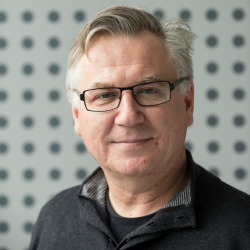
Pancreatic cancer - a precise approach
We are working to advance treatments and options for pancreatic cancer patients
A diagnosis of pancreatic cancer is one of the most devastating anyone can receive. Survival rates are bleak and showing few signs of improvement – fewer than three in every 100 people diagnosed with the disease can expect to be alive after five years. And to compound the problem, pancreatic cancer is on the increase. It’s moving from being the fifth most common cause of cancer death 20 years ago to the third, and is expected to push into second place within the next ten years.
The scale of the challenge facing cancer scientists may seem almost insurmountable, but our team at Glasgow are meeting it head on. Led by Andrew Biankin, Regius Professor of Surgery and Director of the Wolfson Wohl Cancer Research Centre, they are making significant advances which give hope.
“It’s a very aggressive disease,” says Professor Biankin, an international leader in precision oncology who is at the forefront of the University’s accomplishments in tackling pancreatic cancer. “Often it’s diagnosed so late it makes clinical trials very difficult to do.”
Professor Biankin and his group are driven by the aim of understanding pancreatic cancer at a molecular level. One section of the group looks at clinical aspects of the disease – sequencing tumours and identifying biomarkers in those tumours that could inform patient treatment – and the other carries out preclinical work, studying cell biology and examining the underlying mechanisms which drive pancreatic cancer.
But this is the theory. Progress is needed urgently, and Professor Biankin’s flagship initiative Precision-Panc is making progress. This pioneering therapeutic development platform uses a precision medicine approach to find and understand molecular differences between each patient’s specific form of pancreatic cancer, in order to target them with all and only the right treatments for their individual tumour.
“Precision-Panc works by aligning the different areas that are required to take something from a novel discovery through to a successful treatment,” says Professor Biankin. “Time is critical in the treatment of pancreatic cancer, and the serial approach to clinical trials – where a trial is considered only after all other standards of care are exhausted – is usually too late for those with the disease. In addition, many modern trials require biopsies, and doing this in series rather than in parallel takes more time than most patients have. It is much better to test for all potential options in parallel and have attractive choices in a timely manner.”
Clinical trials provide one of the most optimistic possibilities for advancing the outlook for pancreatic cancer. And with £10m of NHS funding, £8m of which was allocated to Glasgow, groundbreaking new trials under an umbrella called Primus – Pancreatic CanceR Individualised Multi-arm Umbrella Study – have now begun. These are recruiting pancreatic cancer patients as soon after their diagnosis as possible in order to undergo tumour biopsies and apply the targeted treatment most likely to be able to help their condition.
The Primus series of trials provide an amazing opportunity to transform the options available to tackle pancreatic cancer and create new and innovative treatment pathways, or to use existing drugs in different ways. Over 600 patients will be recruited to take part, at first in Glasgow but expanding to include locations throughout the UK.
Precision medicine and cancer research at Glasgow
Professor Biankin, who is from Australia, was attracted to the University through its reputation in cancer sciences and the influential work already being carried out here. “The opportunity to advance precision medicine is substantial in Scotland. The University is well aligned in the precision oncology space. The UK – particularly Scotland – has a really good system for advancing these strategies.” Glasgow is home to a large biospecimen repository for pancreatic cancer which is a vital resource from clinical and discovery perspectives, and we also have one of the biggest diagnostic laboratories in the UK, which handles a huge number of samples.
“The University is well aligned and we share common visions,” he says. “There are a number of things that are going on here that are quite dramatic – and not just in the field of pancreatic cancer. It’s about advancing cancer research, clinical trials and precision medicine in general.”
The precision medicine ecosystem in Scotland also encompasses the Stratified Medicine Scotland Innovation Centre and the Scottish Genomes Partnership, which is co-led by Professor Biankin. He believes that Glasgow and Scotland have the potential to be world-leading in some cancer sciences.
“We’ve built the Glasgow Precision Oncology Laboratory, where we provide all the high-end genomic and molecular data for patient samples and for experimental models. And at the Beatson West of Scotland Cancer Centre we’re giving patients the opportunity to gain a deeper understanding of their tumour, which could help them with the task of getting onto clinical trials and selecting particular therapies. We take a sample of the tumour and provide a personalised genome report of their cancer for them.”
Pancreatic cancer – subtypes
Breakthroughs in pancreatic cancer, though sometimes elusive, are still happening. Professor Biankin’s team recently succeeded in reclassifying the disease into four different subtypes, each with differing characteristics. This leap in our understanding of pancreatic cancer could help identify treatment options for individuals on a more personalised level than has been possible in the past.
“We want to offer every pancreatic cancer patient molecular profiling with a viable and attractive clinical trial option,” says Professor Biankin.
“Nothing worth doing is easy, and in my opinion, the whole platform of Primus studies should continue indefinitely until pancreatic cancer is cured.”
About the researcher
 Professor Andrew Biankin is Regius Professor of Surgery at the University of Glasgow, and an international leader and expert in precision oncology. He is a driving force for the development of personalised medicine for cancer around the world, and he helps lead international efforts in cancer genomics such as the International Cancer Genome Consortium. He also co-leads the Scottish Genomes Partnership. He is motivated by a determination to change treatment options and outcomes for those suffering from pancreatic cancer.
Professor Andrew Biankin is Regius Professor of Surgery at the University of Glasgow, and an international leader and expert in precision oncology. He is a driving force for the development of personalised medicine for cancer around the world, and he helps lead international efforts in cancer genomics such as the International Cancer Genome Consortium. He also co-leads the Scottish Genomes Partnership. He is motivated by a determination to change treatment options and outcomes for those suffering from pancreatic cancer.

